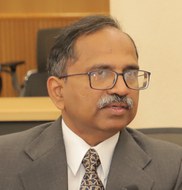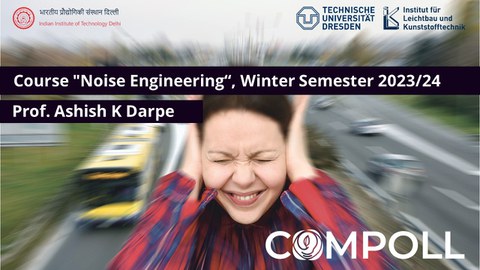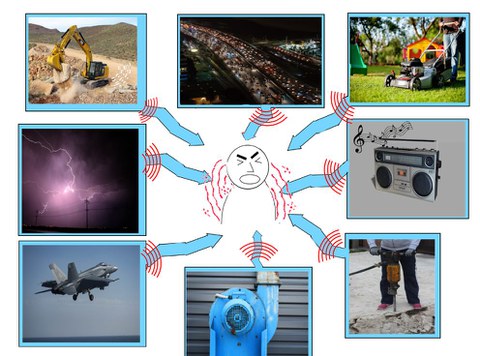COMPOLL Teaching, winter semester 2023/24 - "Noise Engineering"
In the winter semester 2023/24 the COMPOLL block course "Noise Engineering" by Prof. Ashish K Darpe will take place at the ILK.
COURSE OUTLINE
The course gives a foundational understanding of Noise engineering. Beginning with the basic introduction to the sound and noise, its quantification, analysis and most importantly its effect on human beings, the course will highlight the brief understanding of generation, propagation and attenuation of environmental noise. Various metrics quantifying the noise as recorded through measuring equipment will be discussed in relation to the various international standards. Approaches of noise abatement strategies against noise annoyance will be outlined.
COURSE CONTENTS
|
1 |
Introduction to Sound, Sound versus noise |
|
2 |
Quantification of sound, use of logarithmic Scale, level |
|
3 |
Sound Pressure, Sound Intensity and Sound Power |
|
4 |
Octave and one third Octave Bands, Effect of level and frequency on human hearing and perception |
|
6 |
Frequency range and Weighting Filters and their significance, calculation of basic noise metrics from raw data |
|
7 |
Sound Fields, Sound source models and Sound Power Estimation/Measurements, Case study of ground vibration induced noise |
|
8 |
Noise Metrics used in Industry/Various Countries and philosophy/need of having different metric |
|
10 |
Sound absorption and transmission, Reverberant field, free field |
|
11 |
Generation, radiation and propagation of noise, Absorption coefficient, transmission loss |
|
12 |
Design of Barriers and Enclosures, Case study |
|
14 |
Construction Noise, Metro/Railway noise |
|
15 |
Industrial Noise Control Measures |
|
16 |
Noise Pollution, Noise Mapping and monitoring |
|
17 |
Annoyance criteria, Standards and ISO/WHO FRA/FTA noise guidelines, Noise Impact Assessment |
PREREQUISITES
UG/PG students of any branch of engineering, with basic understanding of engineering mathematics.
EXPECTED LEARNING OUTCOMES
The course is mainly designed to give a flavor of fundamentals of noise engineering to an engineering student, keeping the mathematical rigor to minimum. At the end of the course, the student will be able to
- understand key terminology of environmental noise,
- understand the basis of various quantification metrics of noise,
- understand how to measure, analyze and report the noise as per the standards,
- understand various noise abatement approaches,
- appreciate and be aware of the harmful effects of noise pollution.
METHODOLOGY
The course will be delivered in the form of lectures through PowerPoint presentation. After covering some topics, tutorials/experimental demonstration and some case studies will be covered. At the end, students will be evaluated through a quiz based on the topics covered. Term projects would be notified to the students at the end of the first day and would be evaluated through presentation a week later. The overall performance would be graded based on the performance in the tutorials, practical reports, quiz and term project.
COURSE INSTRUCTOR
Prof. Ashish K Darpe is currently a faculty at the Department of Mechanical Engineering, Indian Institute of Technology Delhi, India. His research interests are in the areas of vibration and noise, machine dynamics and health monitoring of machines. He has taught subjects such as Vibration Engineering, Noise Engineering, Rotor Dynamics, Condition Monitoring, etc. for several years at IIT Delhi. His course on Vibration and Noise Engineering has been one of the most popular courses at IIT Delhi with excellent student feedback. He had delivered invited talks at T.U. Munich, University of Alberta, University of Dalhousie, Canada, VTT Knowledge Centre Finland, UESTC, Chengdu – China, etc. He has been the lead investigators of several R&D and consulting projects funded by industry and research labs in the areas of Dynamics, Vibration and Noise. He has been a guest researcher at ILK, TU Dresden during May-July 2003 and May-July 2013.
 © IITD
© IITD
Professor of Mechanical Engineering
NameProf. Dr. Ashish Kamalakar Darpe
Indian Institute of Technology Delhi:
Department of Mechanical Engineering IIT Delhi Campus, Hauz Khas
110016 New Delhi
Indien
SCHEDULE
| Wednesday, October 4th, 2023 | ||
| 9:20 - 10:50 | Introduction, Quantification of sound, Decibel level, Sound Pressure, Sound Intensity and Sound Power |
|
| 11:10 - 12:40 | Effect of multiple sound sources, Octave Bands Tutorial on topics covered Effect of level and frequency on human hearing and perception |
|
| 13:00 - 14:30 | Weighting Filters and their significance, Sound Level Meter, Sound Intensity Probe |
|
|
14:50 – 16:20 |
Practical Session: Noise quantification from pressure |
|
| Thursday, October 5th, 2023 | ||
| 9:20 - 10:50 | Significance of power/pressure/intensity, intensity measurements, Sound Power Measurements |
|
| 11:10 - 12:40 | Sound source models, free field and Reverberant field, RT60, Sound absorption and transmission Tutorial on characterizing room acoustics |
|
| 13:00 - 14:30 | Noise Metrics used in Industry/Various Countries and the application based need of having different metrics |
|
|
14:50 – 16:20 |
Practical Session: Measurement of Sound Power as per ISO-3747 |
|
| Tuesday, October 10th, 2023 | ||
| 9:20 - 10:50 | Hazards of Noise Pollution, Annoyance criteria, Standards and ISO/WHO/FRA/FTA noise guidelines |
|
| 11:10 - 12:40 | Design for Quietness, enclosure and barrier design Case Study on noise barrier design |
|
| 13:00 - 14:30 | Tutorial on Insertion Loss, Introduction to Helmholtz resonator and Mufflers |
|
|
14:50 – 16:20 |
Practical Session: Enclosure Design | |
| Wednesday, October 11th, 2023 | ||
| 9:20 - 10:50 | Construction Noise, Transportation Noise | |
| 11:10 - 12:40 | Case study of ground vibration induced noise, Industrial Noise Control | |
| 13:00 - 14:30 | Practical Session: Pass-By Noise/ Measurement of RT60 | |
|
15:10 - 16:00 |
Assessment (Quiz/Paper) | |
| 16:00 - 16:20 | Feedback and Closing Discussions | |
ROOM
ILK, TU Dresden, LIZ - Leichtbau-Innovationszentrum (Lightweight Structures Innovation Centre), Dürerstraße 28, 01307 Dresden - LIZ 404 CAD-Pool
COURSE LANGUAGE
English
SCOPE
2 SWS, 2 ECTS


